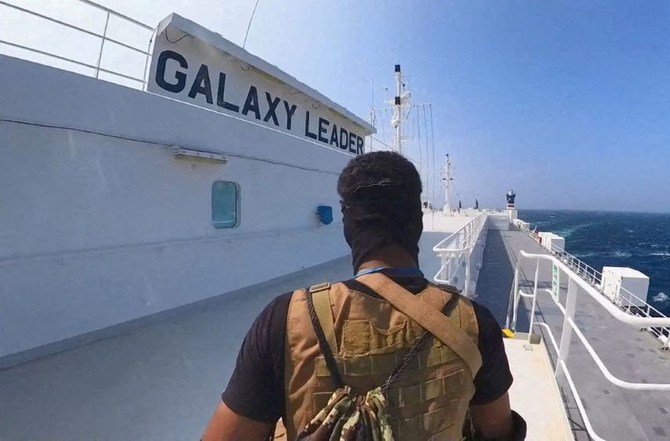AL-MUKALLA: The leader of the Houthi militia in Yemen, Abdul-Malik Al-Houthi, vowed on Wednesday that his troops would continue to attack any Israel-bound ships traveling in the Red Sea until Israel lifts its blockade of Gaza and to fight US-led coalition forces, disregarding international calls for de-escalation and the release of captured ships.
The Houthis’ leader slammed the UK, France, Germany, and Italy for joining the US-led coalition.
“We will not sit quietly by if the Americans go further and commit folly by targeting or attacking our nation,” the Houthi leader said in a televised speech.
“What we loved most, and what we had hoped for from the beginning, was that the fight would be fought directly between us and the Americans and Israelis,” he said.
The Houthi Supreme Political Council also reiterated threats to strike US-led troops in the Red Sea if they impeded them from targeting ships, branding the move as a “hostile act” intended to defend Israel and militarize the Red Sea and the Gulf of Aden.
“We emphasize that the Republic of Yemen is concerned with protecting itself and that any assault or effort to prevent us from carrying out our religious and humanitarian obligation to help and support our people in Palestine would be faced with a harsh reaction,” the Houthi council said in a statement.
The Houthis have launched ballistic missiles and drones toward Israel, as well as targeted ships in the Red Sea that are alleged to be going to Israel.
The Houthi raids led the US to form a multinational task force to protect the Red Sea against the militia’s attacks.
International shipping companies have announced that they would reroute their ships from the Red Sea to avoid Houthi assaults.
The Houthis hijacked a vehicle cargo ship dubbed Galaxy Leader and its 25-member crew on Nov. 19 and moored it off Yemen’s western city of Hodeidah.
The Houthi vow to continue targeting ships came less than a day after the EU, NATO, and other nations, as well as Yemen, criticized the militia’s threats to Red Sea maritime traffic and asked them to free the crew of the hijacked ship.
“We again call on the Houthis to release the Galaxy Leader crew and ship immediately and to cease additional attacks on commercial vessels in the region’s vital waterways,” the countries, also including Japan, Liberia, New Zealand, and Singapore, said in their joint statement.
At the same time, neither the UK Marine Trade Operations nor the US Central Command reported any fresh incidents in the Red Sea on Wednesday.
Despite the quiet period, Elisabeth Kendall, Middle East expert and head of Girton College, University of Cambridge, said that Houthi attacks on ships in the Red Sea will most likely continue despite the presence of international coalition forces and that the Houthis are currently examining the US and its allies’ red lines and will adjust their attacks accordingly.
“The Houthis will probably try to avoid deliberately destroying ships and killing crew because they do not want to provoke direct war. However, they could do so by accident or miscalculation, which is the main danger,” Kendall said.
Kendall thinks that the US, on the other hand, will try to avoid sparking another Middle Eastern crisis and will instead focus on mobilizing forces in the Red Sea and maybe launching “limited” assaults on targets in Houthi-controlled Yemen.
“The US and allies do not want to become embroiled in another Middle East war,” said Kendall.
“Hence, they will likely follow two courses of action: beefing up the US-led international maritime force in the Red Sea and undertaking indirect measures of ‘hybrid’ war.
“There is also the possibility of limited and highly targeted strikes against Houthi military installations and launch sites.”


























